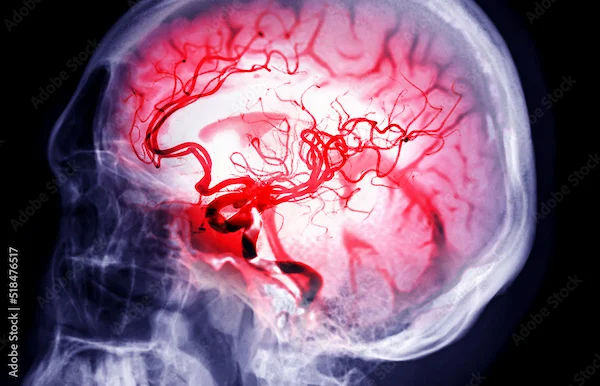Neck Cracking and Stroke Risks: What You Should Know
Is cracking your neck safe? Learn about the potential link between neck cracking and stroke risk, the symptoms to watch for, and tips for keeping your neck healthy and pain-free.

Written by Dr.Sonia Bhatt
Last updated on 3rd Jul, 2025

Introduction
Many of us are familiar with the satisfying crack or pop that comes from cracking our necks. Whether it’s a way to relieve tension, a habit, or just something that feels good, neck cracking is quite common. However, while it might seem harmless, there are risks—particularly when it comes to strokes.
What Exactly is Neck Cracking?
Neck cracking happens when you twist or bend your neck in a certain way, which causes a popping sound. This sound comes from the release of gas bubbles in the fluid that lubricates the joints in your neck. Most of the time, it’s perfectly harmless and just feels good or helps relieve tightness.
Some people even see professionals, like chiropractors or physiotherapists, for neck adjustments as part of their treatment plan. But while neck cracking might feel good at the moment, it’s important to know that there are risks involved, particularly when it comes to strokes.
How Can Neck Cracking Lead to Stroke?
Strokes happen when there’s a sudden disruption in blood flow to the brain, either because a blood vessel is blocked or because it bursts. This can lead to serious, life-threatening complications, so it's essential to understand the risks involved with neck cracking.
In rare cases, neck cracking can cause a problem in the vertebral arteries, which are blood vessels in the neck that supply blood to the brain. If these arteries get stretched, torn, or injured during neck cracking, it could cause a clot to form, disrupt blood flow, and potentially trigger a stroke.
This problem is known as vertebral artery dissection, and while it's not common, it’s something to be aware of, especially if you have certain health conditions. The risk is higher if neck cracking is done suddenly or with a lot of force, as these movements can stress the arteries in the neck.
You don’t need to worry that every time you crack your neck, you’ll have a stroke. These types of injuries are very rare. But for some people, especially those with underlying health conditions, neck cracking could increase the risk.
Who is at Risk?
Certain factors can make someone more likely to experience a stroke after neck cracking. These include:
Existing neck or spine problems that may already be weakening the arteries.
A history of heart disease or stroke, which may affect blood flow in the body.
High blood pressure can also increase the chances of injury to blood vessels in the neck.
Connective tissue disorders (such as Ehlers-Danlos Syndrome) that make blood vessels more fragile.
If any of these apply to you, it’s especially important to be cautious with neck cracking and to discuss it with your doctor before continuing this habit.
What Should You Look Out for? Understanding Stroke Symptoms
If you do crack your neck and suddenly feel unusual symptoms, it’s important to act quickly. Recognising the warning signs of a stroke can make all the difference in getting the right treatment in time.
Here are some common stroke symptoms to watch out for:
Sudden weakness or numbness in one side of the body (like in your arm, face, or leg)
Trouble speaking clearly or understanding others (speech may become slurred)
Sudden vision problems, like blurred vision or double vision
Severe headache that comes on unexpectedly
Dizziness, balance problems, or trouble walking
If you experience any of these symptoms after cracking your neck, don’t wait. Call emergency services right away.
Chiropractic Care and Neck Adjustments
Chiropractors are trained to adjust the spine and neck to help with alignment, reduce pain, and improve movement. However, some chiropractic treatments involve quick or forceful movements, which may carry a small risk of vertebral artery dissection if not done carefully.
While cases of strokes after chiropractic care are rare, they have been documented, and they highlight the need for caution, particularly if you already have risk factors for vascular issues.
If you are considering chiropractic care, it’s important to speak with your doctor first, especially if you have any concerns. They can help you weigh the risks and benefits based on your health condition.
Is Neck Cracking Safe?
In most cases, occasional neck cracking is not harmful, and most people who do it don’t experience any serious health issues. However, if you’re frequently cracking your neck or experiencing pain or discomfort, it could be a sign that you should be more cautious. Here are some tips for reducing the risks:
Avoid Forceful or Sudden Movements: It’s fine to gently turn your neck or stretch it a little to relieve tension, but avoid sudden, forceful twists that could put a strain on your neck and blood vessels.
Listen to Your Body: If cracking your neck ever feels painful or uncomfortable, stop doing it. Pain is your body’s way of telling you that something might not be right.
Don’t Crack Your Neck Too Often: If you find yourself cracking your neck regularly, it might be worth checking in with a healthcare provider. Frequent cracking could be a sign of an underlying issue, and it’s better to get advice on how to safely address it.
Get Professional Help for Ongoing Neck Pain: If you have chronic neck pain or stiffness, it’s important to consult with a healthcare professional to address the root cause. They can recommend safer treatments that won’t put your neck or brain at risk.
Be Aware of Any Health Conditions: If you have high blood pressure, a history of stroke, or any other medical condition that affects your blood vessels, be sure to talk to your doctor before continuing any form of neck manipulation. They can offer personalised advice to keep you safe.
How to Keep Your Neck Healthy
To avoid neck pain and reduce the temptation to crack your neck, consider these tips for keeping your neck in good shape:
Exercise regularly: Strengthening the muscles around your neck can prevent stiffness and reduce the urge to crack it. Gentle activities like yoga or Pilates can help.
Maintain good posture: Poor posture, especially when using a computer or looking at a phone, can strain your neck. Make sure your workspace is set up correctly and take regular breaks to stretch.
Use a supportive pillow: Your pillow should support the natural curve of your neck while sleeping. If it’s too high or too flat, it could cause strain.
Stay hydrated: Dehydration can lead to muscle stiffness, so drinking plenty of water each day helps your muscles and joints stay flexible.
Conclusion
While neck cracking might seem like an innocent habit, it’s important to be aware of the potential risks, especially when it comes to stroke. Fortunately, the risk of a stroke from neck cracking is very low, but if you have any concerns or underlying health conditions, it’s always best to err on the side of caution. If you’re unsure whether neck cracking is safe for you, speak with your healthcare provider. They can help you assess your risk and guide you toward safer ways to manage neck pain and tension. By taking simple precautions, such as avoiding forceful movements and paying attention to your body, you can enjoy a healthy, pain-free neck without putting your brain at risk.
Consult Top Neurologists
Consult Top Neurologists

Dr. Amit Kapoor
Neurosurgeon
18 Years • D.N.B NeuroSurg.
Delhi
Apollo Hospitals Indraprastha, Delhi

Dr Sindhu D M
Neurologist
5 Years • MBBS (BMCRI) DM Neurology (NIMHANS ) PDF Epilepsy (NIMHANS)
Bengaluru
Apollo Hospitals Sheshadripuram, Bengaluru

Dr. H Rahul
Neurologist
10 Years • MBBS, MD(Gen. Med.), DM(Neuro)
Secunderabad
Apollo Hospitals Secunderabad, Secunderabad
(100+ Patients)

Dr. Suresh P
Neurologist
9 Years • MD, DM(Neuro)
Madurai
Apollo Speciality Hospitals KK Nagar, Madurai
(25+ Patients)
Dr. Lakshaman K
Neurologist
19 Years • MBBS,MS General Medicine,MCH Neurosurgery
Bengaluru
R V speciality Clinic, Bengaluru




